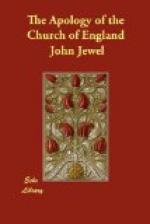But what need we rehearse concubines and bawds? as for that is now an ordinary and a gainful sin at Rome. For harlots sit there now-a-days, not as they did in times past, without the city walls, and with their faces hid and covered, but they dwell in palaces and fair houses: they stray about in court and market, and that with bare and open face: as who say, they may not only lawfully do it, but ought also to be praised for so doing. What should we say any more of this? Their vicious and abominable life is now thoroughly known to the whole world. Bernard writeth roundly and truly of the Bishop of Rome’s house, yea, and of the Bishop of Rome himself. “Thy palace,” saith he, “taketh in good men, but it maketh none; naughty persons thrive there, and the good appayre and decay.” And whosoever he were which wrote the Tripartite work, annexed to the Council Lateranense, saith thus: “So excessive at this day is the riot, as well in the prelates and bishops as in the clerks and priests, that it is horrible to be told.”
But these things be not only grown in ure, and so by custom and continual time well allowed, as all the rest of their doings in manner be, but they are now waxen old and rotten ripe. For who hath not heard what a heinous act Peter Aloisius, Pope Paul the Third’s son, committed against Cosmus Cherius, the Bishop of Fanum; what John, Archbishop of Beneventum, the Pope’s legate at Venice, wrote in the commendation of a most abominable filthiness: and how he set forth, with most loathsome words and wicked eloquence, the matter which ought not once to proceed out of anybody’s mouth! To whose ears hath it not come, that N. Diasius, a Spaniard, being purposely sent from Rome into Germany, so shamefully and devilishly murdered his own brother John Diasius, a most innocent and a most godly man, only because he had embraced the Gospel of Jesu Christ, and would not return again to Rome?




